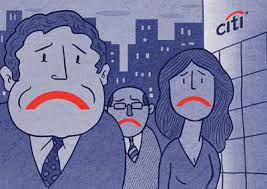U.S. credit card defaults rose in February to their highest level in at least 20 years, with losses particularly severe at American Express Co (AXP) and Citigroup (C) amid a deepening recession.
AmEx, the largest U.S. charge card operator by sales volume, said its net charge-off rate -- debts companies believe they will never be able to collect -- rose to 8.70 percent in February from 8.30 percent in January.
Subscribe to All American Investor via Email
U.S. credit card defaults rise to 20 year-high
By Juan Lagorio
NEW YORK (Reuters) - U.S. credit card defaults rose in February to their highest level in at least 20 years, with losses particularly severe at American Express Co (AXP) amid a deepening recession.
AmEx, the largest U.S. charge card operator by sales volume, said its net charge-off rate -- debts companies believe they will never be able to collect -- rose to 8.70 percent in February from 8.30 percent in January.
The credit card company's shares wiped out early gains and ended down 3.3 percent as loan losses exceeded expectations. Moshe Orenbuch, an analyst at Credit Suisse, said American Express credit card losses were 10 basis points larger than forecast.
In addition, Citigroup Inc (C) -- one of the largest issuers of MasterCard cards -- disappointed analysts as its default rate soared to 9.33 percent in February, from 6.95 percent a month earlier, according to a report based on trusts representing a portion of securitized credit card debt.
"There is a continued deterioration. Trends in credit cards will get worse before they start getting better," said Walter Todd, a portfolio manager at Greenwood Capital Associates.
U.S. unemployment -- currently at 8.1 percent -- is seen approach 10 percent as the country endures its worst recession since World War Two, leaving more than 13 million Americans jobless, according to a Reuters poll of economists.
However, not all were bad surprises. JPMorgan Chase & Co (JPM) and Capital One reported higher credit card losses, but they were below analysts expectations.
Chase -- a big issuer of Visa cards -- reported its charge-off rate rose to 6.35 percent in February from 5.94 percent in January. The loss rate for the first two months of the quarter is 126 bps from the previous quarterly average compared to an estimate of a 145 bp increase, Orenbuch said.
Capital One Financial Corp's (COF)default rate increased to 8.06 percent in February from 7.82 percent in January.
MORE PAIN AHEAD
Analysts estimate credit card chargeoffs could climb to between 9 and 10 percent this year from 6 to 7 percent at the end of 2008. In that scenario, such losses could total $70 billion to $75 billion in 2009.
"People underestimated the severity of the downturn we are experiencing and I wouldn't be surprised to see them north of 10 percent," said Todd, who added American Express was most exposed to higher credit card losses, given its sole reliance on the industry.
Credit card lenders are trying to protect themselves by tightening credit limits, rising standards, and closing accounts. They have also been slashing rewards, raising interest rates and increasing fees to cushion further losses.
Meredith Whitney, one of Wall Street's best known and most bearish bank analysts, estimates that Americans' credit card lines will be cut by $2.7 trillion, or 50 percent, by the end of 2010 -- and fewer Americans will be offered new cards.
"We believe that the US credit card industry will feel additional credit pain over the next 12-18 months. Until lenders like Capital One show stabilization, followed by trend-bucking improvement over a several-month period, we will continue to remain bearish on credit card lenders," said John Williams, an analyst at Macquarie Research.
Todd said credit card issuers shares -- which are down up to 60 percent in 2009 -- will remain under pressure until the end of 2009, or early next year, when bad loans could start to redeem.
(Reporting by Juan Lagorio, editing by Bernard Orr)
 Bob DeMarco is a citizen journalist and twenty year Wall Street veteran. Bob has written more than 500 articles with more than 11,000 links to his work on the Internet. Content from All American Investor has been syndicated on Reuters, the Wall Street Journal, Fox News, Pluck, Blog Critics, and a growing list of newspaper websites. Bob is actively seeking syndication and writing assignments. Bob DeMarco is a citizen journalist and twenty year Wall Street veteran. Bob has written more than 500 articles with more than 11,000 links to his work on the Internet. Content from All American Investor has been syndicated on Reuters, the Wall Street Journal, Fox News, Pluck, Blog Critics, and a growing list of newspaper websites. Bob is actively seeking syndication and writing assignments. |
Follow All American Investor on Twitter
More from All American Investor






